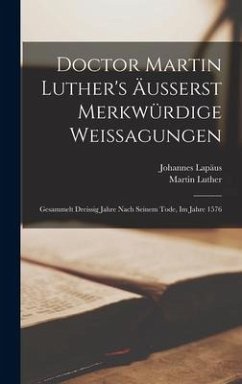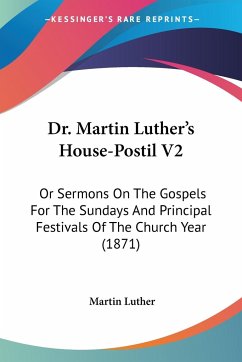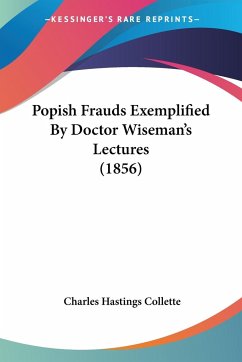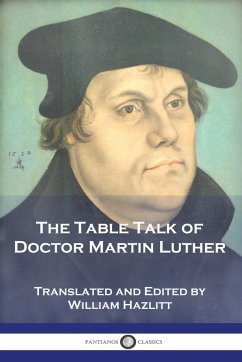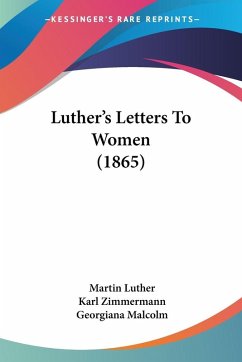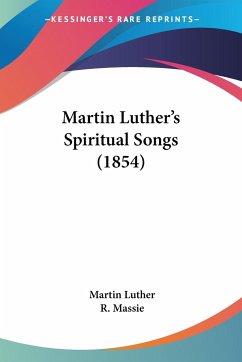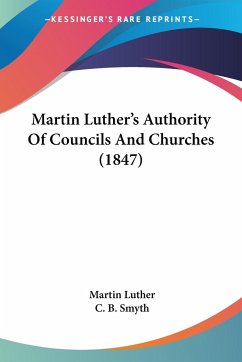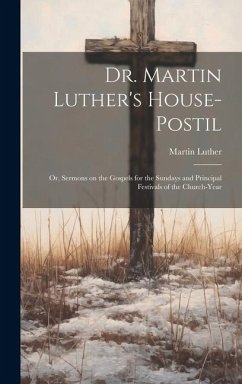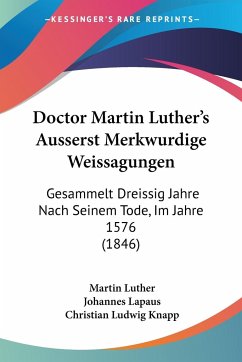
Doctor Martin Luther's Ausserst Merkwurdige Weissagungen
Gesammelt Dreissig Jahre Nach Seinem Tode, Im Jahre 1576 (1846)
Versandkostenfrei!
Versandfertig in 1-2 Wochen
35,99 €
inkl. MwSt.

PAYBACK Punkte
18 °P sammeln!
Das Buch ""Doctor Martin Luther's Ausserst Merkwurdige Weissagungen: Gesammelt Dreissig Jahre Nach Seinem Tode, Im Jahre 1576"" von Martin Luther ist eine Sammlung von Prophezeiungen, die der ber¿¿¿¿¿hmte deutsche Theologe und Reformator in seinem Leben gemacht hat. Die Prophezeiungen wurden drei¿¿¿¿¿ig Jahre nach Luthers Tod im Jahr 1576 gesammelt und in diesem Buch ver¿¿¿¿¿¿ffentlicht. Die Sammlung enth¿¿¿¿¿lt zahlreiche Vorhersagen zu politischen Ereignissen, Kriegen, Naturkatastrophen und religi¿¿¿¿¿¿sen Themen. Das Buch ist eine interessante Lekt¿¿¿¿¿re f¿...
Das Buch ""Doctor Martin Luther's Ausserst Merkwurdige Weissagungen: Gesammelt Dreissig Jahre Nach Seinem Tode, Im Jahre 1576"" von Martin Luther ist eine Sammlung von Prophezeiungen, die der ber¿¿¿¿¿hmte deutsche Theologe und Reformator in seinem Leben gemacht hat. Die Prophezeiungen wurden drei¿¿¿¿¿ig Jahre nach Luthers Tod im Jahr 1576 gesammelt und in diesem Buch ver¿¿¿¿¿¿ffentlicht. Die Sammlung enth¿¿¿¿¿lt zahlreiche Vorhersagen zu politischen Ereignissen, Kriegen, Naturkatastrophen und religi¿¿¿¿¿¿sen Themen. Das Buch ist eine interessante Lekt¿¿¿¿¿re f¿¿¿¿¿r alle, die an Luthers Leben und Werk interessiert sind und sich f¿¿¿¿¿r Prophezeiungen und Vorhersagen interessieren.This scarce antiquarian book is a facsimile reprint of the old original and may contain some imperfections such as library marks and notations. Because we believe this work is culturally important, we have made it available as part of our commitment for protecting, preserving, and promoting the world's literature in affordable, high quality, modern editions, that are true to their original work.



